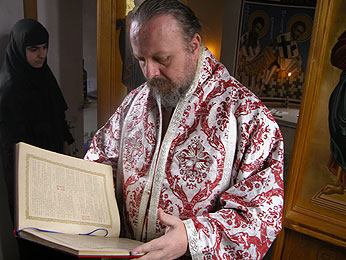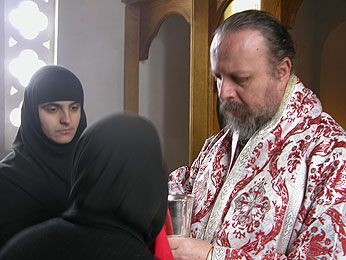The Repentance of Zacchaeus ( 10.02.2008 )
Today, on the day of the St. Isaac the Syrian and
And Jesus entered and passed through
And he ran before, and climbed up into a sycamore tree to see him: for he was to pass that way.
Here is an everlasting, alive, and up-to-date evangelical example of how a man, though only having initial and imperfect faith, out of overwhelming desire and yearning to see the Lord and to ascertain whether it is Him, can very easily relinquish his worldly glory, even if he knew that he would seem foolish and ludicrous in the eyes of the entire public. How many of us are truly prepared to give up their vainglory, their false glory, and how many of us are prepared to look miserly and serve as an object of disdain for the Lord and for the potential encounter with Him; even from far away, even not knowing or just hoping that afterwards they would have to receive Him in their homes. This is the salto mortale of the ‘former man’ that very few are ready to perform, in the hopes that, still, in the end, the hand of the Lord will gently catch them. I believe that the chief of the publicans, the wealthy Zacchaeus, thought exactly like that and felt exactly like that when running forward and climbing the sycamore tree. But that will not remain unnoticed and unrequited by Him Who sees all and Who knows the hearts of all, the Godman Christ.
And when Jesus came to the place, he looked up, and saw him, and said unto him, “Zacchaeus, make haste, and come down; for to day I must abide at thy house”. The Lord addresses Zacchaeus by his name and unveils his desire the same way as with Nathaniel, whom He saw while he was still under the sycamore tree. And just as with Nathaniel, who immediately understood that the One to Whom, at the time all his prayers were directed, is the Same, as this very Jesus, Who now stands before him, so does now Zacchaeus, climbed on the sycamore tree, understand that his heart, that is, his name and person with all the secret thoughts and desires, as well as the yearning to accept Him in his home, is unveiled before this very Christ, Who truly, as he had heard before, cannot be anyone else but the Lord Himself, the God’s Anointed One, the Son of the Blessed One.
And he made haste, and came down—already knowing very well, through his strengthened and justified faith, both Who is calling him, and Whom is he to receive in his home—and received Him joyfully. And he rejoiced because of it, as a man rejoices in the first grace.
And when they (all those who have high opinion of themselves and who, out of jealousy, judge and condemn) saw it, they all murmured, saying, That he was gone to be guest with a man that is a sinner.
But Zacchaeus, with his genuine, practicing repentance, justified the presence of the Godman Christ in his home: And Zacchaeus stood, and said unto the Lord: “Behold, Lord, the half of my goods I give to the poor; and if I have taken any thing from any man by false accusation, I restore him fourfold”. At that moment Zacchaeus sufficiently liberates himself both from the passion of avarice and behaves as the one to whom the Lord says: “if thou wilt be perfect, go and sell that thou hast, and give to the poor, and thou shalt have treasure in heaven: and come and follow Me” (Matthew 19:21). And indeed that happens—Zacchaeus gives almost, if not all of his property, and he receives the treasure in heaven. By liberating himself to a sufficient degree from the passion of vainglory and to a sufficient degree from the passion of avarice, man usually liberates himself to a sufficient degree from the passion of self-indulgence as well: “But rather give alms of such things as ye have; and, behold, all things are clean unto you” (Luke 11:41). This is a description of a heart sufficiently purified from the passions.
Salvation is always linked to the opening of the heart, to the actualization of the grace of Baptism and to the illumination of the mind—I would even say to the mind-and-heart prayer—even in the last moments of our life. This is how I understand the Lord’s, that is, Jesus’ words with which He justified the acts of Zacchaeus and confirmed his new spiritual state—illumination: “this day is salvation come to this house, forsomuch as he also is a son of Abraham (namely, as he is of the ones who inherit the Kingdom of God), for the Son of Man is come to seek and to save that which was lost” (Luke 19:1-10).
This is another confirmation for the subsequent correct struggle and spiritual development of Zacchaeus from his life: “The holy Apostle Zacchaeus was at first a publican and a sinner, but when the Lord saw him climbed on a tree in

